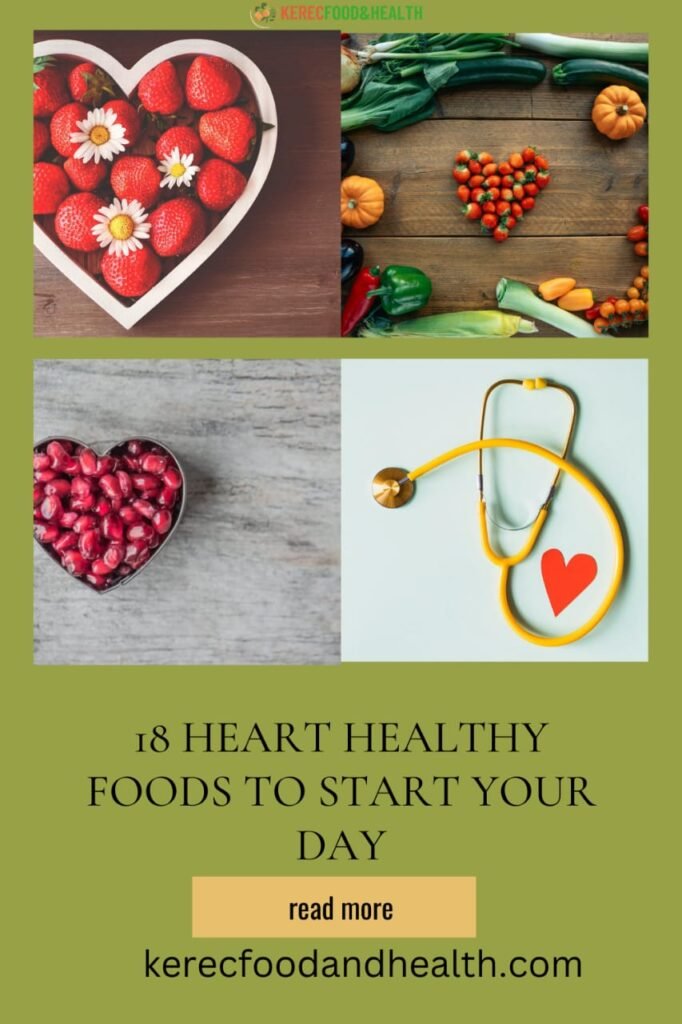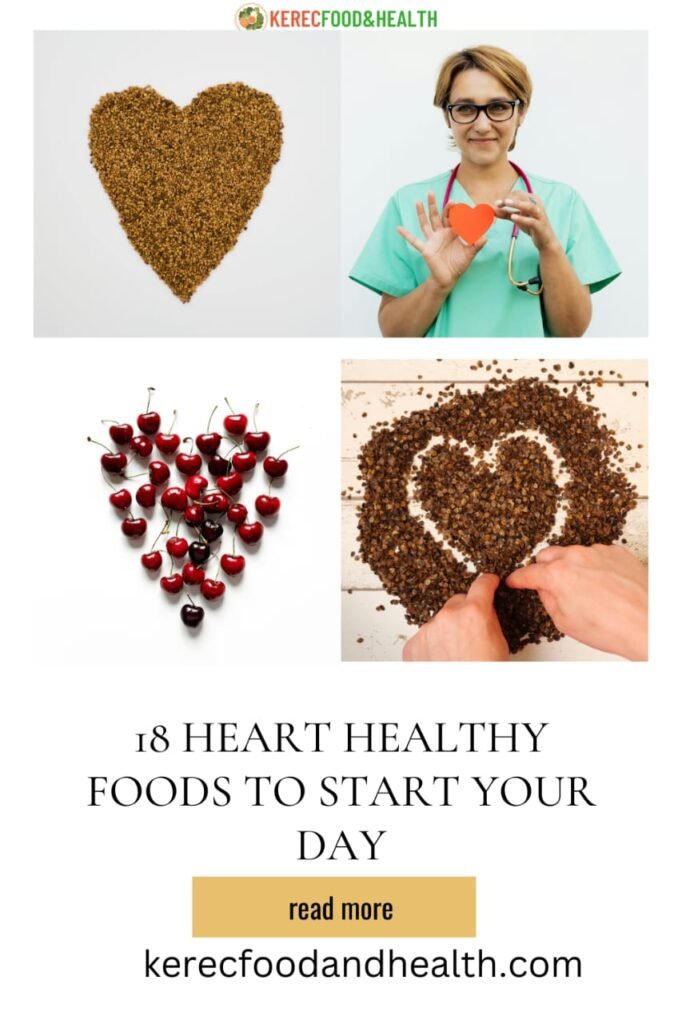A healthy heart is the cornerstone of overall well-being, and what better way to support it than by fueling your body with nutritious foods at the start of your day? Breakfast is often called the most important meal of the day, and for good reason. It sets the tone for your energy levels and food choices throughout the day. Incorporating heart-healthy foods into your morning routine can help lower cholesterol, manage blood pressure, and reduce the risk of heart disease. In this blog post, we’ll explore 18 delicious and nutritious foods that are perfect for breakfast. From vibrant fruits and whole grains to healthy fats and lean proteins, these foods will not only satisfy your taste buds but also provide the essential nutrients your heart needs. Let’s discover how to kick-start your day with a heart-healthy breakfast that nourishes both body and soul!
Heart Healthy Foods
Diet plays a crucial role in your heart health and can significantly impact your risk of heart disease, which is the leading cause of most death for adults.
When it comes to maintaining your heart health, it is important to focus on a well-balanced diet that includes a variety of nutrient-rich foods that can influence heart health and reduce heart disease risk factors, such as blood pressure, inflammation, triglycerides and cholesterol levels


Top 18 best heart healthy foods you should eat to maximize your heart health.
1. Fatty Fish
Rich in omega-3 fatty acids, fatty fishes like salmon, mackerel, tuna, sardines, and trout can help reduce inflammation, and lower the risk of heart disease.
The Omega-3 fatty acids in fatty fishes may reduce the risk of CVD events and arrhythmias.
Regular consumption of fatty fishes may support lower levels of total cholesterol, blood triglycerides, fasting blood sugar, and systolic blood pressure.
Fatty fishes and their oil supplements may reduce rates of cardiovascular disease, depression, mortality, cardiac death, sudden death, and stroke.
Here are some of the best fatty fish to include in your diet:
- Salmon: One of the richest sources of omega-3s, salmon also provides high-quality protein and vitamins D and B12. Wild-caught salmon tends to have a higher omega-3 content than farmed varieties.
- Mackerel: This oily fish is packed with omega-3 fatty acids and is also a great source of vitamin D and selenium. It has a strong flavor and can be enjoyed smoked or grilled.
- Sardines: Often canned, sardines are rich in omega-3s, calcium, and vitamin B12. They are also low in mercury, making them a safe and nutritious choice.
- Herring: This small, oily fish is high in omega-3 fatty acids and vitamin D. It can be enjoyed pickled, smoked, or fresh.
- Anchovies: These small fish are packed with omega-3s, protein, and calcium. They are often used in sauces, salads, and pizzas, adding a savory flavor.
- Trout: Especially rainbow trout, this freshwater fish is a good source of omega-3s and is often farmed sustainably. It has a mild flavor and is versatile for cooking.
- Tuna: Particularly albacore tuna, is a good source of omega-3s, but it is important to limit intake due to higher mercury levels. Fresh or canned tuna can be enjoyed in salads or sandwiches.
- Halibut: While lower in omega-3s compared to other fatty fish, halibut is still a healthy choice, offering lean protein and various vitamins and minerals.
Including these fatty fish in your diet a few times a week can provide significant heart health benefits. Aim for grilled, baked, or steamed preparations to keep meals healthy and flavorful!
2. Leafy Green Vegetables
Greens such as spinach, kale, mustard greens, arugula, Swiss chard, and collard greens is rich in vitamins, minerals, and antioxidants( vitamins A, vitamins B-6, vitamins C, vitamins E, vitamins K, selenium, niacin, zinc, potassium, phosphorus, copper, betaine, calcium, manganese, and iron).
Leafy greens are also high in dietary fiber and low in calories, making them excellent choices for heart health.
They are great source of vitamin K, which helps to protect your arteries and promote proper blood clotting.
Leafy greens are high in dietary nitrates, that can help reduce blood pressure, decrease stiffness of arterial, and improve the function of cells lining the blood vessels.
An increased levels of leafy green vegetable intake can have significant benefits to your cardiovascular health and will lower the risk of heart disease.
Here are some of the best options for heart healthy leafy greens to include in your diet:
- Spinach: Rich in vitamins A, C, and K, spinach also contains folate, potassium, and antioxidants that help lower blood pressure and improve blood vessel function.
- Kale: This nutrient-dense green is high in fiber, vitamins C and K, and antioxidants, which can help reduce cholesterol levels and promote cardiovascular health.
- Swiss Chard: Swiss chard is rich in magnesium, which helps relax blood vessels and improve circulation. It also contains fiber and vitamins that support heart health.
- Collard Greens: These greens are an excellent source of vitamins K and A, calcium, and fiber, which can help lower cholesterol levels and improve overall heart health.
- Romaine Lettuce: Romaine is low in calories and high in fiber, vitamins A and C, and potassium, contributing to healthy blood pressure levels.
- Arugula: This peppery green is rich in nitrates, which can help improve blood flow and lower blood pressure. It’s also a good source of vitamins K and C.
- Mustard Greens: Mustard greens are high in antioxidants and vitamins A, C, and K, and they may help reduce inflammation and improve heart health.
Incorporating these leafy greens into your diet can be as simple as adding them to salads, smoothies, or stir-fries. Aim for a variety of greens to maximize their heart-healthy benefits!
3. Berries
Berries are not only delicious but also packed with nutrients that can promote heart health.
Blueberries, strawberries, raspberries, and blackberries are packed with antioxidants, which can help reduce inflammation and improve heart health.
Berries are loaded with lots of antioxidants like anthocyanins, that can protect against or reduce oxidative stress and inflammations that can lead to the development of various heart disease.
Anthocyanins may have a protective effect against heart disease. They can improve blood vessel function, and lower blood pressure, which can contribute to a healthier cardiovascular system.
Regular consumption of blueberries may improve the function of cells that line the blood vessels, which helps to control blood pressure and blood clotting.
Berries are used as satisfying or delicious snack, and dessert.
Here are some of the most heart-healthy berries to include in your diet:
- Blueberries: High in antioxidants, particularly anthocyanins, blueberries can help reduce blood pressure and improve cholesterol levels. They are also rich in vitamins C and K, as well as fiber.
- Strawberries: These bright berries are a great source of vitamin C, folate, and potassium. Their high fiber content and antioxidants can help lower LDL (bad) cholesterol levels and reduce inflammation.
- Raspberries: Rich in fiber and vitamins C and K, raspberries also contain antioxidants that may help protect against heart disease. Their fiber content can aid in maintaining healthy cholesterol levels.
- Blackberries: Blackberries are high in fiber, vitamin C, and antioxidants. They can help improve heart health by reducing inflammation and lowering cholesterol levels.
- Cranberries: Known for their urinary health benefits, cranberries also contain antioxidants that may help improve cardiovascular health by reducing inflammation and preventing blood clots.
- Acai Berries: Although often found in juice or smoothie form, acai berries are rich in antioxidants and heart-healthy fats. They can help improve cholesterol levels and reduce inflammation.
- Goji Berries: These nutrient-dense berries are high in antioxidants, vitamins, and minerals. They may help improve blood circulation and reduce the risk of heart disease.
Incorporating a variety of these berries into your diet can be as simple as adding them to smoothies, oatmeal, yogurt, or salads. Enjoying a colorful mix can provide a range of beneficial nutrients for heart health!
4. Whole Grains
Whole grains are an essential part of a heart-healthy diet, offering numerous benefits for cardiovascular health. You can opt for whole grains like oats, brown rice, quinoa, and whole wheat bread as they are high in fiber and can help lower cholesterol levels.
Here are some of the best heart healthy whole grains to include in your diet
Incorporating a variety of these whole grains into your meals can enhance heart health and provide essential nutrients. Consider using them in salads, soups, or as side dishes to reap their benefits!
5. Nuts And Seeds
Almonds, walnuts, chia seeds, and flaxseeds are great sources of heart-healthy fats like omega-3 fatty acids, fiber, and antioxidants, that can reduce heart disease and reduce the risk of inflammation, high blood pressure, high cholesterol, and triglycerides levels.
Hemp seeds are rich source of arginine amino acid, that is associated with reduced blood levels.
Incorporating flaxseed into your diets may lower diabetes, cardiovascular and cancer disease
Chia seeds contain dietary fibers, antioxidants, and omega‐3 fatty acids, that can help reduce blood pressure, blot clots, and LDL cholesterol.
Walnuts may lower your cholesterol and protect against inflammation in your heart’s arteries. Walnut is packed with omega-3 fatty acids, healthy fats called monounsaturated fats, plant sterols, and fibers that can help to lower bad LDL cholesterol and can improves your heart health.
Nuts and seeds are nutrient-dense foods that can provide numerous heart health benefits. They are rich in healthy fats, fiber, protein, vitamins, and minerals. Here are some of the best options for heart-healthy nuts and seeds:
Nuts
- Walnuts: High in omega-3 fatty acids, walnuts can help reduce inflammation and lower cholesterol levels. They are also a good source of antioxidants and fiber.
- Almonds: Almonds are rich in vitamin E, magnesium, and fiber. They can help lower LDL cholesterol and are associated with a reduced risk of heart disease.
- Pistachios: These nuts are lower in calories and high in protein, fiber, and antioxidants. Eating pistachios can help lower cholesterol and improve heart health.
- Cashews: Cashews are a good source of healthy fats, magnesium, and antioxidants. They can help improve cholesterol levels and support overall heart health.
- Hazelnuts: Rich in vitamin E, healthy fats, and antioxidants, hazelnuts can help lower cholesterol and improve heart health.
- Brazil Nuts: High in selenium, Brazil nuts are beneficial for heart health. They also contain healthy fats and can help lower cholesterol levels.
Seeds
- Chia Seeds: Packed with omega-3 fatty acids, fiber, and protein, chia seeds can help lower cholesterol and support heart health. They can be added to smoothies, yogurt, or oatmeal.
- Flaxseeds: Flaxseeds are an excellent source of omega-3s and lignans, which have antioxidant properties. Ground flaxseeds can be added to smoothies, baked goods, or cereals.
- Pumpkin Seeds: Rich in magnesium, zinc, and healthy fats, pumpkin seeds can help regulate blood pressure and support heart health.
- Sunflower Seeds: These seeds are high in vitamin E, healthy fats, and antioxidants. They can help lower cholesterol levels and reduce inflammation.
- Sesame Seeds: Sesame seeds contain healthy fats, fiber, and antioxidants. They may help lower cholesterol and improve heart health when consumed regularly.
Incorporation Tips:
- Add nuts and seeds to salads, oatmeal, yogurt, or smoothies.
- Use them as toppings for dishes or in baking.
- Enjoy them as a healthy snack.
While nuts and seeds are heart-healthy, they are also calorie-dense, so moderation is key to enjoying their benefits without overdoing calorie intake.
6. Legumes
Legumes are an excellent addition to a heart-healthy diet due to their high fiber content, plant-based protein, and various nutrients.
Beans, lentils, and chickpeas are high in soluble fiber, which can help lower LDL cholesterol and maintain heart health.
Black beans are packed with heart-healthy nutrients like folate, antioxidants, and magnesium that can help lower blood pressure.
The fiber content in legumes can helps control both cholesterol and blood sugar levels.
Here are some of the best legumes to include for heart health:
- Lentils: High in fiber, protein, and essential nutrients like folate and iron, lentils can help lower cholesterol levels and improve heart health. They are versatile and can be added to soups, salads, or side dishes.
- Chickpeas: Also known as garbanzo beans, chickpeas are a great source of protein, fiber, and various vitamins and minerals. They can help lower cholesterol and blood pressure, making them heart-healthy.
- Black Beans: Rich in fiber, antioxidants, and protein, black beans can help improve cholesterol levels and support overall heart health. They are delicious in salads, soups, and burritos.
- 4. Kidney Beans: These beans are high in fiber, protein, and essential nutrients like potassium and magnesium, which can help regulate blood pressure and support heart health.
- Navy Beans: Navy beans are an excellent source of soluble fiber, which can help lower cholesterol levels. They are also high in protein and essential minerals, making them a nutritious choice.
- Pinto Beans: These beans are rich in fiber, protein, and antioxidants. They can help lower cholesterol and promote heart health. They work well in various dishes, including tacos and chili.
- Edamame: Young soybeans, or edamame, are high in protein and fiber. They also contain healthy fats and antioxidants that can support heart health.
- Split Peas: High in fiber and protein, split peas are low in fat and can help lower cholesterol levels and support heart health. They are commonly used in soups and stews.
Incorporating these legumes into your meals can boost your intake of heart-healthy nutrients. Consider adding them to salads, soups, stir-fries, or as a side dish to enjoy their numerous health benefits!
7. Olive Oil
Swap unhealthy fats with heart-healthy fats like olive oil. It is a good source of monounsaturated fats, which has been linked to a lower risk of heart disease.
Olive oil is rich in antioxidants, that can help reduce inflammation and decrease the risk of chronic heart disease.
Olive oil are excellent source of oleic acid and antioxidants that can help prevent and treat hypertension.
Research has revealed that people who consume olive oil do have lower risk of developing heart disease by 35% and a 48% lower risk of dying from heart disease.
8. Avocados
Rich in heart-healthy monounsaturated fats and fiber, avocados can help lower LDL cholesterol levels, improve heart health and lower risk of heart disease.
Consuming at least two servings of avocado each week can reduced the risk of cardiovascular disease by 16% and reduced risk of coronary heart disease by 21% .
Avocados are excellent source of fiber, potassium, B vitamins, vitamin K, and vitamin E, which are essential to your heart health, and can help reduce blood pressure.
One serving of avocado provide you with about 21% of the amount of potassium you need daily.
9. Dark Chocolate
In moderation, dark chocolate with a high cocoa content (70% or more) can provide antioxidants and flavonoids that may help reduce the risk of heart disease.
Consuming chocolate in moderation reduce your risk of coronary heart disease, stroke, and even diabetes.
10. Apples
Apples are rich source of antioxidants, that can fight free radicals. Free radicals cause undesirable changes in the body and may contribute to aging process and chronic conditions.
The antioxidant in apples may extend a person’s life span and also reduce the risk of some chronic diseases.
This powerfully fruit is an excellent source of fiber, vitamins C, vitamin K, and vitamin E which are all heart friendly.
11. Walnuts
Walnuts are excellent source of fiber and micronutrients like magnesium, copper, and manganese, that can help protect against heart or cardiovascular disease. They can also reduce LDL (bad) and total cholesterol levels.
12. Beans
Beans are rich source of resistant starch, that can exert a healthy impact on the gut and certain members of its resident microbiota.
Regular consumption of beans can reduce total cholesterol levels, LDL (bad) cholesterol levels, and certain risk factors for heart diseases.
Eating beans can also improve glycemic control and blood pressure, and can even reduce the risk for cardiovascular disease, like diabetes.
13. Tomatoes
Tomatoes are loaded with lycopene, a powerful antioxidant that can help neutralize harmful free radicals, and prevents oxidative damages and inflammation, that can lead to heart disease.
High levels of lycopene are can reduce the risk of heart attack and stroke.
Regular consumption of tomato products and intake of lycopene supplementation can positively affect your blood lipids, blood pressure, and endothelial function.
Tomatoes may help lower LDL cholesterol, and triglycerides levels, while it raises HDL cholesterol levels. Higher HDL (good) cholesterol levels can help remove excess bad cholesterol and plaque from your arteries, so as to keep your heart healthy and protect against heart diseases and stroke.
The body will absorbs lycopene better from cooked tomatoes and tomato products than from fresh tomatoes.
14. Almonds
Almond is rich in vitamins and minerals such as, magnesium, iron, calcium, vitamin E, and riboflavin, that is crucial to your heart health.
They are excellent source of heart-healthy monounsaturated fats and fiber, that can help protect against heart disease.
Almonds can significantly reduce total cholesterol levels. Eating almonds daily can reduce belly fat and LDL (bad) cholesterol levels, which are risk factors for heart disease.
Regular consumption of almonds can increase levels of HDL (good) cholesterol, that can help reduce plaque buildup and keep your arteries clear.
Almond has high levels of calories and should be eaten in moderation, if you’re trying to lose weight.
15. Green Tea
A cup of green tea can be a great addition to your heart-healthy diet. Green tea is rich in antioxidants and has been associated with a lower risk of developing heart disease.
They are rich in polyphenols and catechins antioxidants that can help prevent cell damage, reduce inflammation, and protect health heart.
Green tea may increase fat burning, improved insulin sensitivity, and prevents cancer.
Drinking green tea can increase leptin, a hormone that can regulates appetite, and reduces LDL (bad) cholesterol levels.
Green tea can also improve blood pressure and glycemic control. As they can reduce blood pressure, triglycerides, LDL (bad), and total cholesterol levels.
16. Garlic
Garlic has powerful compound called allicin, that may help improve your heart health and other therapeutic effects.
Taking garlic or garlic supplements can help lower both systolic and diastolic blood pressure, inhibit platelet buildup, and may even reduce the risk of blood clots and stroke.
17. Oatmeal
Oatmeal has cardiovascular health benefits due to their low-fat content and high soluble fiber content that can help lower bad cholesterol (LDL) levels and reduce cardiovascular risk factors.
They contains complex carbohydrates and soluble fiber that can slow down digestion and help stabilize blood glucose levels.
They are excellent Source of folate and potassium which have heart health benefits.
18. Sweet Potatoes
Sweet potatoes are excellent source of dietary fiber, vitamin A, vitamin C, vitamin B-6, potassium, and lycopene.
They are also power pack with iron, calcium, protein, and complex carbohydrates that can help with heart health.
Regular consumption of sweet potato can have significant benefits to your cardiovascular health and will help lower the risk of cardiovascular diseases.
Bottom Line
Remember, it’s important to consult with a healthcare professional or registered dietitian before making significant changes to your diet, especially if you have any existing health conditions.
Source
- 17 Incredibly Heart-Healthy Foods. Jerlyn Jones, Rachael Ajmera, and Heather Hobbs. August 8, 2023.https://www.healthline.com/nutrition/heart-healthy-foods.
- What are the most healthy foods? Natalie Olsen and Alex Novakovic. March 31, 2023. https://www.medicalnewstoday.com/articles/245259.
- 21 Foods That Can Save Your Heart. Dany Paul Baby. August 28, 2023. https://www.webmd.com/heart-disease/ss/slideshow-foods-to-save-your-heart.
- What are the best foods for heart health? David Railton and Tim Newman. March 31, 2023. https://www.medicalnewstoday.com/articles/321820.






Pingback: 10 Health Benefits of Eating Peaches You Didn’t Know About